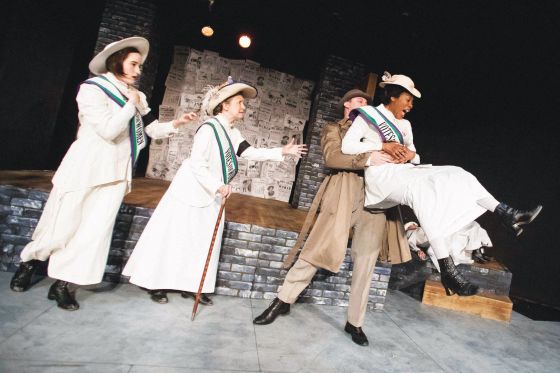
When even African-American essayist Booker T. Washington declared European women—in particular, those of England's urban centers—to be exploited under the law to a degree exceeding the men of his own country, who could dispute the need for their immediate enfranchisement? Making a case for women's right to vote in nations encumbered by several more centuries of oppression than ours, however, often mandated civil disobedience—and suppression thereof—of a severity approaching violence. When police arrested and jailed speakers at public rallies sponsored by organizations like the Women's Social and Political Union (WSPU), the prisoners adopted hunger strikes, precipitating implementation of invasive tactics such as forced-feeding. If outcry over the dissidents' mistreatment succeeded in orchestrating their release, open-ended warrants enabled them to be remanded into police custody—that is, until a squad of female bodyguards trained in jujitsu arose to protect its leaders from capture. The central issue then, in The Good Fight, Anne Bertram's docudrama, revolves around the justification of physical coercion in the pursuit of human rights. At the very outset, WSPU organizer Grace Roe worries that the perpetrator of a recent church fire might have been one of their supporters—crimes against property being tolerated, but not those endangering lives. Over the course of the play—a period spanning 1912-1915—we hear dissent over the morality of martyrdom, the ethics of martial arts as a self-defense measure and the strategic advantages to suspending sectarian agendas to assist in the war against Germany. (This decision was not greeted with unanimous accord; "If we fight like men, build bombs like men and rejoice in war like men, soon we'll vote like men," protests pacifist Harriet Kerr.) Bertram's text is so saturated with historical minutiae that it takes us awhile to make the connection between young women chivvied by constables for distributing leaflets and those same women later approved by former opponents after toiling in the munitions factories. Audiences questioning the applicability of battles long fought and won to global conditions in 2018 may also be slow in recalling populations today marginalized on the basis of gender. In the meantime, Elizabeth Lovelady's direction and Gaby Labotka's fight design for the agile actors (including three males playing assorted buffoons and beanbags) of the Babes With Blades Theatre Company gives action-adventure aficionados plenty to cheer.
